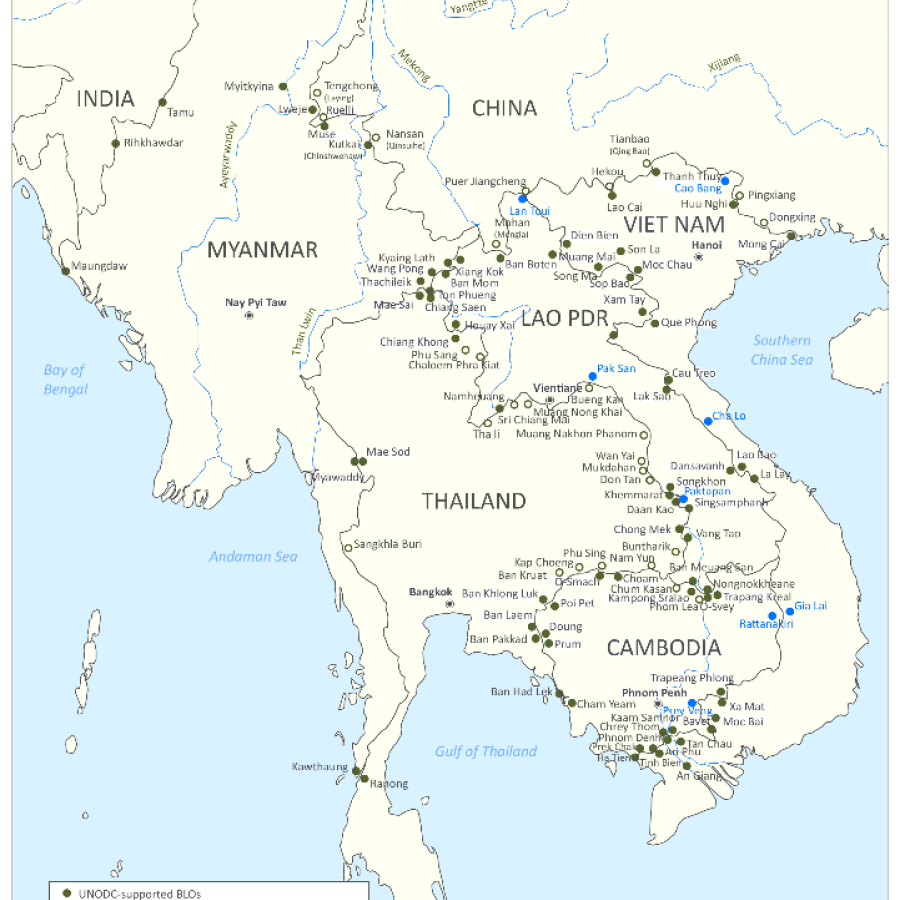Responding to COVID-19, UNODC equips frontline border officers across Myanmar with personal protective equipment
11 June 2020
- UNODC and the Myanmar Police Force (MPF) took an important step towards improving border security and mitigating the impacts of COVID-19 today, as UNODC handed over significant quantities of personal protective equipment (PPE) for use at border liaison offices (BLOs) across Myanmar.
UNODC provided the MPF with 20,000 surgical masks, 200 pairs of goggles, 8,000 pairs of disposable gloves, 160 protective suits and 60 contactless temperature scanners, which will now be used by frontline border officers at 13 land border crossings. The equipment was supplied by China’s Ministry of Public Security, who donated the PPE to UNODC for distribution across the BLO network.
“To ensure Myanmar’s border checkpoints are secure, frontline officers need to know they can carry out their job without unnecessary risk of contracting COVID-19,” said UNODC Officer in Charge for Myanmar, Marie Pegie-Cauchois. “Which is why UNODC has prioritized getting PPE and personal safety guides to those working in BLOs. It’s an essential step in preventing organized crime from taking advantage of the situation more than they already have. Human trafficking, migrant smuggling, wildlife and timber trafficking, and, particularly urgent given the situation in Myanmar, illicit drug flows, are at risk of increasing if border checkpoints are not operating as effectively as possible. We believe today’s handover of PPE is a significant step forward in mitigating these risks as we move forward.”

The handover takes place at a crucial point, as discussions of reopening borders and increasing trade between Myanmar and its neighbours are ongoing. As borders reopen, increased trade flows are expected, particularly in the initial days following border openings, emphasizing the importance of preparing BLOs and frontline officers now. Alongside the equipment being handed over are personal safety guides developed by UNODC providing detailed information on officer safety, effectively using PPE, as well as how standard operating procedures can be effectively adapted to allow licit goods to cross borders with minimal friction in the context of the COVID-19 pandemic.
“We’re optimistic borders will reopen in the near future but we know it needs to be done safely,” said UNODC law enforcement expert Valentina Pancieri. “In this context, this handover is important for both increasing border security and for preventing the spread of COVID-19. This PPE is essential for keeping frontline officers safe, as well as those crossing the borders, so we really see this as a win-win situation, protecting public health and preventing illicit trafficking.”
The BLO network, coordinated by UNODC's Border Management Programme, is a central part of efforts to reduce illicit trafficking and to improve border management across the Mekong region. The network, which strengthens cross-border cooperation and information sharing at border crossings to counter transnational organized crime, has shown its effectiveness throughout the COVID-19 outbreak, providing a mechanism through which to quickly deliver PPE and info guides to border officers across Myanmar, and the rest of the region. UNODC now supports more than 70 BLOs throughout Southeast Asia, providing them with a combination of training, tools, systems and equipment on an ongoing basis.
The UNODC Regional Programme for Southeast Asia Sub-Programme 1 on Transnational Organised Crime and Illicit Trafficking helps strengthen cross-border law enforcement cooperation in particular through establishing and supporting border liaison offices in the region. The UNODC Country Programme for Myanmar Sub-Programme 1: Transnational Organized Crime and Illicit Trafficking similarly assists Myanmar with strengthening cross-border law enforcement cooperation in-part through establishing and supporting BLOs.
Click here for more information on UNODC's Myanmar Country Programme.
Click here to read more on the UNODC Border Management Programme.



